Stories from Jajarkot
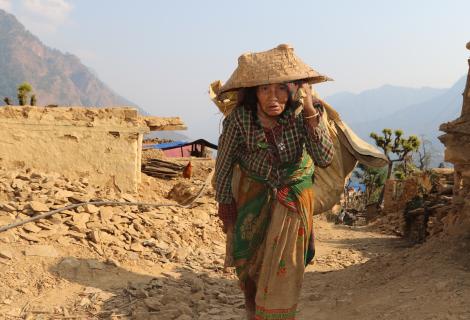
On November 3rd, 2023, Jajarkot-Nepal was struck by a sequence of earthquakes and aftershocks, with the most powerful one measuring a magnitude of 6.4. Located in Ramidanda in Jajarkot District, approximately 65 kilometres northeast of Surkhet, the capital city of Karnali Province, the epicentre of the earthquake was identified. The earthquakes and aftershocks had a devastating impact on Jajarkot and Rukkum, causing the loss of 153 lives and injuring 256 individuals. Additionally, a staggering 90% of the population was displaced as a result. There are more than 45 health institutions and 208 schools in the affected regions of Jajarkot and Rukum West.
Nestled amidst the rugged landscapes of western Nepal, Jajarkot stood as a testament to resilience even in the face of numerous social, cultural, educational, and health challenges long before the earthquake reshaped its terrain. Within this district, social stratification based on caste and gender permeated everyday life, casting shadows of discrimination and inequality over its communities. Cultural preservation often clashed with the forces of modernization, presenting a delicate balance between honoring tradition and embracing change. Educational endeavors were hindered by sparse infrastructure and limited resources, perpetuating cycles of poverty and underdevelopment. Access to healthcare remained a distant dream for many, with remote villages lacking basic medical facilities and skilled professionals. Amidst these challenges, however, glimmers of hope emerged through awareness and advocacy efforts, particularly in the realm of women's leadership and rights. Despite entrenched gender norms, initiatives promoting women's empowerment gained momentum, advocating for their active participation in decision-making processes and championing their rights within the community. As Jajarkot continues its journey of recovery and reconstruction post-earthquake, addressing these multifaceted challenges while fostering greater awareness and advocacy for women's leadership and rights remains essential for building a more equitable and resilient society:

Story of Hasta Kumari Kami
Following the devastating earthquake which struck Kolchaur-Jajarkot, Hasta Kumari Kami's life was irrevocably changed. That fateful night of the earthquake brought an overwhelming wave of tragedy as she endured the heart-wrenching loss of six cherished family members, including her daughter-in-law and five precious grandchildren. In addition to the unimaginable grief, she also suffered severe injuries herself. Three months have gone by since that unforgettable night, yet for Hasta, the anguish and sorrow persist, her eyes still brimming with tears.
Hasta's journey has been a remarkable testament to their relentless drive and unwavering spirit. Having lost her spouse fifteen years ago, she courageously raised her two sons and three daughters in the face of countless challenges. By November 3, 2023, everything came to a halt as the devastating earthquake struck, plunging Hasta into a state of despair and disarray.
Hasta is deeply affected by the physical and psychological impact of the earthquake. Her injuries have severely impacted her mobility, making it difficult for her to use her hands and legs. The persistent pain in her head serves as a constant reminder of the traumatic experience she went through. Coming back to her destroyed home only intensifies her pain, as she relives the sorrow of bidding farewell to her dear ones amidst the debris.
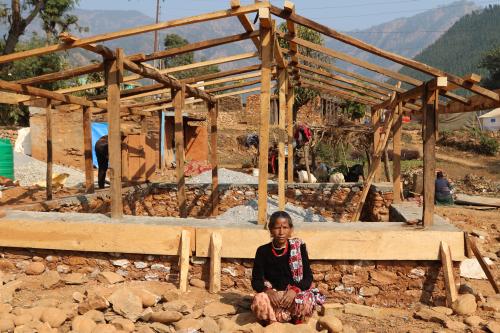
Coming from a marginalised and economically disadvantaged background, Hasta faces numerous challenges due to systemic barriers that restrict her access to resources and support. Without strong leadership and support, women like Hasta are forced to face the challenges of post-disaster recovery alone, exacerbating the already significant gap between them and the help they so desperately require.
Hasta is facing additional difficulties due to the emotional upheaval caused by her son's homecoming. After the devastating loss of his wife and children, Hasta finds himself struggling to find the strength and belief to start anew, which leads to a sense of isolation and a lack of support. As she struggles with her own turmoil, she finds herself at a crossroads, unsure of which path to take and where to seek guidance.
However, in the midst of despair, a glimmer of hope emerges. By supporting women like Hasta and giving them a platform to share their experiences in post-disaster recovery efforts, we can work towards inclusivity and ensure that everyone is included in the process. By focusing on advocacy and fostering inclusive leadership, we can establish systems and structures that prioritise the well-being of women. This will enable us to offer them the necessary support and resources to rebuild their lives and communities.
Hasta Kumari Kami's story is a poignant reminder of the importance of women's leadership in times of crisis. As she faces the obstacles that lie ahead, let's unite in support of her and other women in similar situations, collaborating to create a stronger and more inclusive future for everyone.
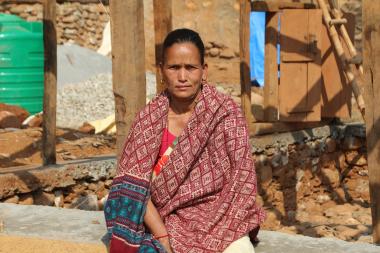
Story of Geeta Raut
In the aftermath of the earthquake that ravaged their community, 47 years old Geeta Raut's life descended into a cycle of violence and despair. For years, she had endured domestic abuse for giving birth to 4 daughters at the hands of her husband, seeking solace in the hope of a better future. Yet, the earthquake brought not only destruction but also intensified her suffering, trapping her in a web of violence from which there seemed to be no escape.
Geeta's story is one of resilience in the face of unimaginable adversity. Married off at a young age, she endured years of abuse and torment, her cries for help falling on deaf ears in a patriarchal society that turned a blind eye to violence against women. Even the tragic loss of her daughter in a road accident failed to elicit sympathy from her husband, who saw her grief as an opportunity to exploit her further.
When the earthquake struck, Geeta's world crumbled around her. Left homeless and vulnerable, she found herself at the mercy of a system that offered little in the way of support or justice. Relief materials meant to aid survivors were siphoned off by her husband's family, leaving Geeta with nothing but bruises and broken promises.
In the midst of her despair, Geeta found herself grappling with the harsh realities of life as a woman in a society that valued male dominance above all else. Despite efforts to prioritize women in post-disaster recovery programs, many like Geeta continued to suffer in silence, their voices drowned out by the clamor of a society unwilling to confront its own failings.
Yet, amidst the darkness, there is hope. As communities come together to rebuild in the wake of disaster, there is an opportunity to empower women like Geeta and break the cycle of violence that has plagued them for far too long. By centering women's voices in decision-making processes and advocating for their rights, we can create a future where no woman is left behind.
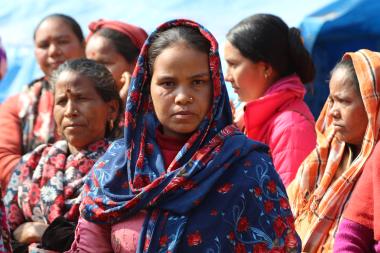
Story of Sushmita BK
In the aftermath of the earthquake, Sushmita Bick's world crumbled around her. At just 26 years old, she found herself widowed and burdened with the sole responsibility of raising her two young sons. Struggling to make ends meet and facing a lack of support from the state, Sushmita's journey is a stark reminder of the unique challenges faced by women in times of crisis.
Married off at a young age, Sushmita's education was cut short, leaving her ill-equipped to navigate the complexities of life as a single mother. With no home to call her own and no means of earning a livelihood, she felt as though the weight of the world had been placed squarely on her shoulders.
"I can neither teach them nor feed them nor provide for them," Sushmita lamented, her voice tinged with desperation. "I went everywhere seeking help, but no one listened. My children's future hangs in the balance, and I am powerless to change it."
In a society where women's voices are often silenced and their concerns dismissed, Sushmita's plight is all too familiar. Despite her best efforts, she finds herself trapped in a cycle of poverty and despair, unable to break free from the constraints of her circumstances.
But amidst the darkness, there is hope. As communities come together to rebuild in the wake of disaster, there is an opportunity to empower women like Sushmita and break down the barriers that hold them back. By advocating for women's rights and providing access to education and economic opportunities, we can create a future where no woman is left behind.

Story of Abhi Thapa
In the remote district of Jajarkot, Nepal, Abhi Thapa's story serves as a poignant reminder of the harsh realities faced by many in the aftermath of the earthquake. At 80 years old, Abhi's life is a testament to resilience in the face of unimaginable adversity.
Abhi's world was shattered when he learned that his 74-year-old wife was battling cancer. In a place where access to healthcare is limited and the nearest health post is hours away, the prospect of seeking treatment seemed like an impossible task. With their home destroyed by the earthquake and their livelihood in ruins, Abhi and his wife found themselves on the brink of despair.
"We have nothing to eat, no medicine, not even salt or sugar," Abhi lamented, his voice heavy with sorrow. "I fear that my wife will not survive this ordeal."
The lack of healthcare facilities is just one of the challenges facing Abhi and his family. His daughter, a victim of domestic violence, was forced to flee her marital home after her husband took another wife. Now, she finds herself back at her parents' house, struggling to care for her sick mother and elderly father.
"I have nowhere else to go," she whispers, her eyes filled with tears. "But here, too, life is a constant struggle."
In the face of such adversity, it is clear that women like Abhi's daughter are in desperate need of support and empowerment. Without access to relief materials or proper documentation, they are left vulnerable and marginalized, their voices drowned out by the clamor of a society that fails to recognize their worth.
But amidst the darkness, there is hope. By prioritizing women's empowerment and sustainable livelihoods, we can create a future where no woman is left behind. Through targeted advocacy and support, we can ensure that women like Abhi's daughter have the resources and opportunities they need to rebuild their lives and communities.
Story of Phulkumari
In the heart of Jajarkot, where prejudice and oppression reign, Phulkumari Damai's (name changed) story stands as a testament to the silent suffering endured by countless women. At 46 years old and a mother of five, Phulkumari's life has been marred by violence and fear at the hands of her husband.
For years, Phulkumari has endured unimaginable torment behind closed doors. Her husband's cruelty knows no bounds, escalating to new heights of brutality in the wake of the earthquake. "He is the biggest fear and terror of my life," she whispers, her voice trembling with fear.
The violence Phulkumari faces is not confined to physical abuse. It is a relentless cycle of psychological torment and manipulation, leaving her paralyzed with fear at the mere thought of speaking out. "If he hears me talking outside, he will cut me in two," she confides, her eyes filled with tears.
Even in the sanctuary of her own home, Phulkumari finds no respite. Her husband's tyranny extends to their children and daughter-in-law, forcing her to seek refuge in the homes of neighbors, desperate to escape the wrath that awaits her.
Despite enduring years of abuse, Phulkumari's cries for help have fallen on deaf ears. "He served four years in prison," she reveals, her voice barely above a whisper. "But still, the torture continues."
As she grapples with the relentless onslaught of violence, Phulkumari wonders if there will ever be an end to her suffering. Is there hope for a better future, where she can earn a living without fear, where she can speak out against the violence that plagues her life?
Phulkumari's story is a powerful reminder of the urgent need to break the silence surrounding domestic violence. It is a call to action for society to stand up and speak out against the oppression of women, to provide a voice for those who have been silenced for too long.
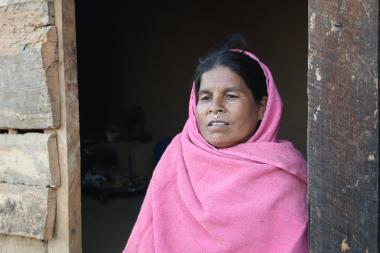
Story of Padamkali
In the heart of Jajarkot lies the shattered remains of Padmakali Bik's home—a poignant symbol of the barriers she faces due to lack of proper documentation. At 50 years old, Padmakali's life is a testament to the countless women who are marginalized and overlooked in the aftermath of disaster.
When the earthquake ravaged her village, Padmakali was trapped beneath the rubble of her collapsed home, her body battered and broken. Rescued from the wreckage, she hoped for support from the state and aid organizations. Yet, as a single woman without the necessary documents, she found herself ignored and forgotten.
Padmakali's plight is compounded by her status as a member of the Dalit community. Discrimination and prejudice further isolate her, leaving her voiceless in a system that prioritizes privilege over need. Without the proper documentation to prove her identity or ownership of her home, she is unable to access the assistance she so desperately needs.
As she navigates the labyrinth of bureaucracy, Padmakali's frustration and despair mount. "I have nothing," she whispers, her voice trembling with emotion. "No home, no help, no hope."
For Padmakali, the makeshift shelters that dot the landscape offer little solace. They are but temporary refuges in a world that has turned its back on her. Her only glimmer of hope lies in the distant possibility of a permanent home—a tower erected by unknown hands, a beacon of possibility in a sea of despair.
Padmakali's story is a powerful reminder of the barriers faced by countless women like her. Trapped by paper walls and systemic neglect, they struggle to rebuild their lives in the wake of disaster.
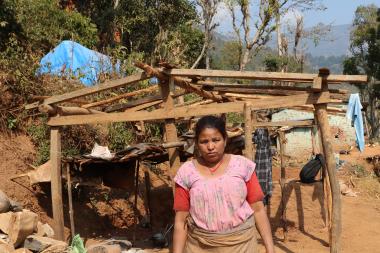
Story of Nandakala
In the rugged terrain of Jajarkot, Nandkala Luhar's story unfolds—a powerful testament to the challenges faced by women in the wake of disaster. For years, she had called a small plot of land her home, a gift from her father. But when the earthquake struck, her world was shattered, leaving her homeless and desperate for help.
As the dust settled and the extent of the devastation became clear, Nandkala found herself grappling with the harsh realities of life in a patriarchal society. Despite being injured and homeless, she received little support from her brothers and neighbors, who were quick to dismiss her plight.
With no relief or assistance forthcoming, Nandkala and her husband were left to fend for themselves, their future uncertain and their dreams shattered. Though local government representatives and neighbors suggested they move to Ailani land, they were unable to do so due to lack of legal documentation and ownership rights.
Trapped in a system that favors men and denies women their rightful inheritance, Nandkala faced an uphill battle for justice. In a society where daughters are deemed unworthy of their father's property, she found herself fighting not only against the forces of nature but against entrenched social norms that sought to diminish her worth.
Yet, despite the odds stacked against her, Nandkala refused to give up hope. With courage and determination, she continued to speak out against injustice, demanding recognition of her rights and the rights of women like her.
Nandkala's story is a rallying cry for change—a call to action for women's empowerment and gender equality in the face of adversity. As she fights for justice, let us stand with her, offering support and solidarity as she paves the way for a more just and equitable society. Together, we can create a future where all women are valued, respected, and given the opportunity to thrive.
Stories of pain and hope
In the echoes of tragedy that reverberate through our lives, we find ourselves grappling with the profound impact of the earthquake's aftermath. For Bimala Rana, a young woman burdened by the weight of familial responsibilities, the path to progress is fraught with obstacles. Raised by a single mother, she knows firsthand the struggles of resilience in the face of adversity. Yet, even as she longs to participate in group discussions and learning sessions, the relentless demands of household chores and familial obligations tether her to her home, stifling her aspirations for growth and empowerment. In her quiet moments of reflection, she yearns for a world where women are trusted and supported, where their contributions are valued and their voices heard.
Meanwhile, for Naina Bdr Bk, the pain of loss and the specter of fear cast a dark shadow over his home. As he grapples with the trauma of his daughter's (daughter of his brother) death in the earthquake, his son's reluctance to return to school underscores the profound impact of tragedy on the young and vulnerable. Caught between the memory of his daughter and the fear of further devastation, Naina finds himself navigating a minefield of emotions, torn between his son's education and his safety. In the crucible of grief, he finds himself confronting the fragility of life and the urgent need for healing and reconciliation.
And then, there is Usha Pun, a mother whose heart is heavy with worry for her newborn daughter. As she tends to her husband's injuries and struggles to rebuild their shattered home, the constant fear of another earthquake looms large in her mind. In the makeshift shelter of a tent, she finds herself wrestling with the twin specters of uncertainty and insecurity, haunted by the possibility of further loss and devastation. In the quiet hours of the night, as she cradles her infant daughter in her arms, she finds solace in the hope that tomorrow will bring a brighter future for them both.
In the stories of Bimala, Naina, and Usha, we see reflected the myriad challenges and struggles faced by women in the aftermath of disaster. Yet, amidst the darkness, there is also resilience, courage, and hope. As we come together to rebuild our lives and communities, let us remember the strength of the human spirit, and the power of solidarity in the face of adversity. Together, we can overcome the challenges that lie ahead, and forge a path towards a brighter tomorrow for all.